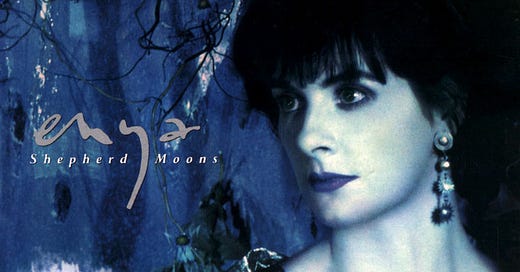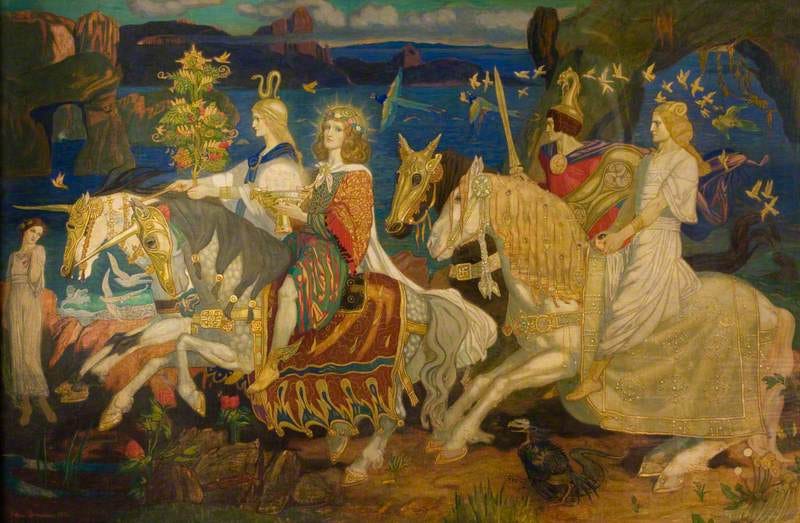Genre of the Day - Celtic New Age
Album of the Day - Shepherd Moons by Enya (1991)
If you like this genre – Celtic Chant, Andean New Age, New Age Kirtan
Over the brief window of peace that is Thanksgiving break from academics—inasmuch as I can ignore more looming papers and assignments due as soon as I return—I found myself suddenly realizing I have been in a fiction-reading drought going on a few months. During the harvest season of autumn, I see now that my crop of whimsy must be nourished by a fictional world. Luckily, Little Free Libraries are thoughtfully nestled across my hometown neighborhood, and I found a book perfect in length upon my first visit: Voltaire’s satirical novella, Candide, a high school-staple that I somehow dodged. Our optimistic main character Candide is confronted with the darkest depths of the human experience in the French philosopher’s takedown of Enlightenment-era metaphysical optimism.
Today’s genre also emerges as an implicit chapter in the rejection of certain European philosophical and political promises. In nation-building and imperialism, the Celtic nations were among those most maltreated within the European continent during a supposed age of reason and progress. I briefly explored this theme in Brittany’s Celtic folk music earlier this month. It’s little surprise, then, that Celtic music became a central touchstone to New Age music, if New Age music can be interpreted as an endorsement of more mystical, spiritually-inclined modes of thinking and creating in reaction to mounting western sociopolitical challenges in the 1970s and ‘80s. As the Troubles in northern Ireland captured global attention during the latter decades of the 20th century, Celtic New Age also was perhaps seen by many foreign listeners as an affirmation of deep beauty and hope in Celtic culture. But there is also a deep inclination towards pan-Celticism as a paragon of magick and unfamiliar, ancient grandeur.
Musically, Celtic new age was differentiated by its incorporation of unbroken centuries of Celtic culture’s self-assertion through distinctive vocal stylings and delicate yet emotionally charged singing. Vocalists, particularly women, were more central in Celtic strains of new age than in other subgenres. A general dreaminess has often colored the output of Irish greats like My Bloody Valentine, the Cranberries, and U2. New age production and padding supercharged this sensibility, in conjunction with traditional instrumentation like harp, bagpipes, and fiddle, gently woven into these blissful soundscapes. Some artists pull directly from Celtic folklore lyrically in buttressing New Age’s themes of fantasy and escapism; for others, the Celtic details are more woven in through the instrumental ornamentation.
The prima donna of Celtic New Age is a singer that probably popped into your head from the moment you read this article's title—Enya, whose meditative, ethereal music became world-conquering. She grew up speaking Gaelic and came up in the pioneering Celtic band Clannad, making her primed to take up the mantle of fusing Celtic ideas into music as storytelling—her entry into making solo music came after she set the musical scene to the documentary The Celts. 1991’s Shepherd Moons opens with a track in which not a word is uttered, just frigid yet romantic voices swirling over dripping piano. The evocative hit “Caribbean Blue,” follows, fluttering harpsichords punctuating impressive and gorgeous musical ideas teased out from the softer side of the synth spectrum. A long history of hymnal music educates her approach to “How Can I Keep from Singing,” her willowy voice testifying to the triumphal power of music. Though the album is calming, it refuses to be inert—bells and staccato strings drive “Book of Days” and its bilingual declaration of spiritual motivation. “Smaointe…” closes, a fully Gaelic lamentation focused on the naked vulnerability of her voice and bagpipes, rich and beautiful in its emotional starkness and its assertion of the relevance of the Irish language, and Celtic culture more widely.







Love this album!